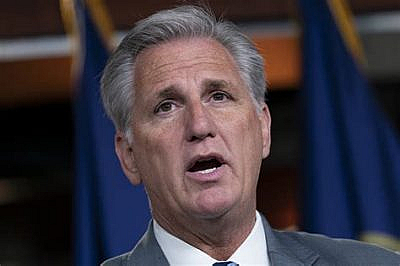President Joe Biden and Speaker Kevin McCarthy reached an agreement on Saturday to raise the debt ceiling after days of negotiations.
Summary
President Joe Biden and Speaker Kevin McCarthy reached an agreement on Saturday to raise the debt ceiling after days of negotiations. If the agreement passes, it will prevent a default that would be devastating to the US economy. Here’s what’s in the 99-page bill:
- In a twist, the deal raises the debt ceiling for two years rather than raising it by a specific monetary amount. The agreement will kick the next debt ceiling increase to after the 2024 presidential election, setting it up to be a top agenda item for whoever wins.
- This is coupled with a two-year budget deal to maintain the status quo spending level for 2024 while the 2025 budget would actually see spending cuts.
- Manchin got his pipeline: Federal approval for the $6.6 billion Mountain Valley natural gas pipeline stretching from West Virginia to Virginia made it into the text of the deal.
- Permitting reform is left in the cold: The bill only includes minor revisions to environmental permitting regulations, a key priority for members of both parties. Major reforms to the permitting process will have to be handled as a separate bill.
- COVID is over, for real: The deal claws back billions in unused COVID funds passed as part of the trillion-dollar assistance packages enacted by Donald Trump and Biden in 2020 and 2021.
- Welfare to work: Republicans secured additional work requirements for childless food stamp recipients.
- Veterans’ Healthcare: Spending on veterans will increase under the deal, as Republicans agreed to Biden’s 2024 budget for veterans’ healthcare, including a fund for veterans who were exposed to toxic substances while they served.Bye-IRS: The bill cuts $21.4 billion from the newly expanded IRS budget, which ballooned to $80 billion last year.
![]()
- The New York Times’s Peter Baker asked if Biden gave away “too much” in the deal to House Republicans. The Biden-McCarthy deal “comes at the cost of rankling many in [Biden’s] own party who have little appetite for meeting Republicans in the middle and think the president cannot stop himself from giving away too much in an eternal and ephemeral quest for consensus.”
- NBC News covered Biden’s statement announcing the deal on Sunday. “It takes the threat of catastrophic default off the table,” Biden said. “I strongly urge both chambers to pass that agreement,” he added. “Let’s keep moving forward.”
- Axios reported up to 60 House Republicans, about one-quarter of the Conference, may vote against the final deal. Biden would need to deliver Democratic votes to replace the GOP defectors in order to get the deal through the narrowly divided lower chamber.
![]()
- Not all Democrats were pleased with the deal Biden struck with McCarthy, Breitbart noted. Rep. Debbie Dingell (D-MI) told MSNBC she was “really” “annoyed” that the debt ceiling agreement includes cuts for new IRS workers, but “there is nothing I can do about it.”
- The New York Post covered threats from congressional Republicans to vote against the Biden-McCarthy deal. Rep. Ralph Norman (R-SC) called the deal “insanity,” while Rep. Ken Buck (R-CO) was “appalled” by what he called the “debt ceiling surrender.”
- Fox News reported on comments from Rep. Dusty Johnson (R-SD) dismissing criticisms from some Freedom Caucus members. “When we say conservatives are against it, I want to make it clear, I don’t know a single one of the mainstream caucus conservatives,” Johnson, the chair of the GOP Main Street Caucus who participated in the negotiations, told CNN in a Saturday interview. “There will be Freedom Caucus members that vote for this package. So when you’re saying that conservatives have concerns, it is really the most colorful conservatives. Some of those guys you mentioned didn’t vote for the thing when it was kind of a Republican wish list.”
© Dominic Moore, 2023






